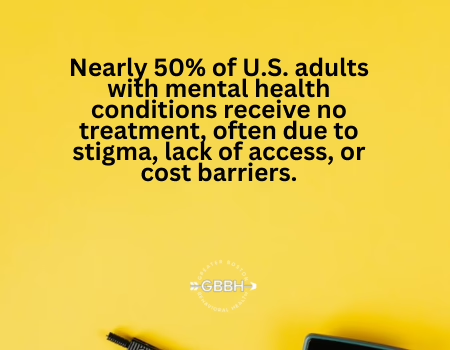Just like physical health, mental health can be affected by various factors, leading to disorders that impact daily life. Knowing what these disorders are can help us find mental health treatment and support.
Mental health disorders affect millions of people worldwide, impacting how they think, feel, and interact with others. These conditions, though widespread, often carry stigma that discourages individuals from seeking help. However, with the right support and treatment, recovery and a fulfilling life are possible. Understanding the most common mental health disorders can help individuals recognize their symptoms and take the first step toward healing.
In this post, we will explore five common mental health disorders, their symptoms, and treatment options available, including different mental health programs.
Anxiety Disorders
Anxiety disorders are among the most prevalent mental health issues. They involve intense feelings of worry or fear that can be overwhelming. Common types include generalized anxiety disorder, panic disorder, and social anxiety disorder.
People with anxiety disorders may experience constant worry, restlessness, difficulty concentrating, and physical symptoms like a rapid heartbeat or sweating. Effective treatments for anxiety disorders often include cognitive-behavioral therapy (CBT), which helps individuals identify and change negative thought patterns. Many mental health therapy programs incorporate CBT techniques, enabling patients to develop coping strategies.
Types of Anxiety Disorders:
- Generalized Anxiety Disorder (GAD): Persistent, excessive worry about everyday activities or events.
- Panic Disorder: Recurrent panic attacks characterized by sudden episodes of intense fear and physical symptoms such as chest pain or dizziness.
- Social Anxiety Disorder: Fear of social situations and judgment by others.
- Specific Phobias: Intense fear of particular objects or situations, such as heights or flying.
Symptoms:
- Restlessness or feeling on edge.
- Fatigue and difficulty concentrating.
- Physical symptoms like muscle tension, rapid heartbeat, or sweating.
- Avoidance of situations that trigger anxiety.
Depression
Depression can affect anyone and may result from a combination of genetic, biological, environmental, and psychological factors.
Signs of depression may include feelings of hopelessness, loss of interest in hobbies, changes in sleep patterns, and difficulty concentrating. Treatment for depression can involve various approaches. Dialectical behavior therapy (DBT) is effective for some individuals, helping them manage emotions and improve relationships. Additionally, Acceptance and Commitment Therapy (ACT) focuses on accepting thoughts and feelings while committing to making positive changes.
Symptoms:
- Persistent sadness or feelings of emptiness.
- Loss of interest in previously enjoyable activities.
- Changes in appetite or weight.
- Sleep disturbances, such as insomnia or oversleeping.
- Fatigue and lack of energy.
- Difficulty concentrating or making decisions.
- Feelings of guilt, worthlessness, or hopelessness.
- Thoughts of self-harm or suicide.
Bipolar Disorder
People with bipolar disorder may experience mood swings from high energy to deep sadness, increased activity during manic phases, and feelings of worthlessness during depressive episodes. A combination of therapy and medications is needed to treat bipolar disorder. Group therapy programs can provide support and help individuals share their experiences. Therapists may also use EMDR therapy (Eye Movement Desensitization and Reprocessing) to address any past traumas that may contribute to mood fluctuations.
Types of Bipolar Disorder:
- Bipolar I Disorder: Defined by at least one manic episode, often severe enough to require hospitalization.
- Bipolar II Disorder: Characterized by hypomanic episodes (less severe than mania) and major depressive episodes.
- Cyclothymic Disorder: Involves periods of hypomanic and depressive symptoms that don’t meet the criteria for full episodes.
Symptoms:
- Manic Episodes: Increased energy, reduced need for sleep, impulsivity, grandiosity, or risky behaviors.
- Depressive Episodes: Persistent sadness, fatigue, feelings of worthlessness, or difficulty concentrating.
- Rapid mood changes in some cases.
Post-Traumatic Stress Disorder (PTSD)
Post-Traumatic Stress Disorder can develop after experiencing or witnessing a traumatic event. Symptoms may occur long after the event, affecting daily functioning.
Individuals with PTSD may face flashbacks, avoidance of reminders of the trauma, heightened reactions, and negative changes in mood. Treatment for PTSD often includes specialized trauma therapy programs. Techniques like EMDR therapy have shown promise in helping individuals process traumatic memories and reduce distress. Additionally, incorporating mindfulness strategies can be beneficial.
Symptoms:
- Intrusive memories or flashbacks of the traumatic event.
- Avoidance of places, people, or activities that trigger memories of the trauma.
- Negative changes in mood or thought patterns, such as detachment or guilt.
- Hypervigilance or being easily startled.
Treatment Options at GBBH:
- Trauma Therapy Programs using approaches like Eye Movement Desensitization and Reprocessing (EMDR) or trauma-focused CBT.
- Family Therapy Programs to help loved ones understand and support the individual’s recovery.
- Partial Hospitalization Programs (PHP) for those needing intensive, daily care to stabilize symptoms.
Attention-Deficit/Hyperactivity Disorder (ADHD)
ADHD is a type of disorder that usually involves difficulty paying attention, impulsivity, and hyperactivity.
Symptoms of ADHD can vary and may include difficulty focusing, forgetfulness, impulsivity, and hyperactive behaviors like fidgeting. Treatment for ADHD usually involves a mix of medication and various behavioral therapies. Cognitive-behavioral therapy (CBT) is particularly helpful in teaching individuals how to manage their symptoms effectively. Additionally, support through group therapy programs allows people to share experiences and coping mechanisms.
How GBBH Supports Sustainable Recovery
At Greater Boston Behavioral Health, we recognize that recovery is a journey unique to each individual. Our comprehensive approach addresses both the symptoms and underlying causes of mental health conditions, combining therapy, medication management, and skill-building.
Key Features of Our Programs:
- Tailored Treatment Plans: Each individual receives a personalized care plan based on their specific challenges and goals.
- Flexible Levels of Care: From PHP to IOP, we offer options that provide the right level of support at every stage of recovery.
- Holistic Interventions: In addition to evidence-based therapies, we integrate mindfulness, stress management, and wellness practices.
- Family Involvement: Through Family Therapy Programs, we strengthen relationships and foster a supportive home environment.
Why Choose Greater Boston Behavioral Health?
1. Expertise and Compassionate Care
Our team of licensed therapists, psychiatrists, and support staff are dedicated to helping individuals achieve meaningful recovery through evidence-based practices and compassionate care.
2. Comprehensive Services
We offer a full spectrum of care, including Anxiety Treatment Programs, Depression Treatment Programs, and Trauma Therapy Programs designed to meet diverse mental health needs.
3. Convenient Access
Located in Boston, our facility provides a welcoming and accessible space for individuals seeking high-quality mental health care.
Mental health disorders are common, but they don’t have to define your life. At Greater Boston Behavioral Health, we’re here to guide you through every step of your journey to recovery with compassionate, personalized care.
Contact us today at (888)278-0716 to learn more about our programs, including Group Therapy Programs, Partial Hospitalization Programs, and Family Therapy Programs. Let us help you build a brighter, healthier future.
Conclusion
Mental health disorders can affect anyone, but understanding them is the first step toward seeking help. Treatment options like cognitive-behavioral therapy, dialectical behavior therapy, and Acceptance and Commitment Therapy are effective in managing these disorders.
If you or someone you know is struggling with a mental health disorder, consider reaching out to a mental health treatment center in Massachusetts. These centers often offer a variety of mental health therapy programs, including group therapy programs and trauma therapy programs.
For comprehensive care, the Greater Boston Behavioral Health Center provides a range of services to support individuals in their journey toward mental wellness. Their dedicated team focuses on personalized treatment plans to ensure that each patient receives the help they need to lead fulfilling lives. Seeking support after all, is a courageous step, and resources are available to assist in overcoming challenges.
FAQ on Common Mental Health Disorders
What are the five most common mental health disorders?
The most common mental health disorders are anxiety disorders, depression, bipolar disorder, post-traumatic stress disorder (PTSD), and obsessive-compulsive disorder (OCD).
What are the symptoms of anxiety disorders?
Symptoms include excessive worry, restlessness, rapid heartbeat, difficulty concentrating, and avoidance of triggers.
How is depression treated?
Depression is treated through Depression Treatment Programs, which often include Cognitive Behavioral Therapy (CBT), medication management, and support from Family Therapy Programs.
Who is most at risk for PTSD?
PTSD can affect anyone who has experienced or witnessed a traumatic event, such as combat, abuse, or a natural disaster.
Can OCD be cured?
While OCD may not be “cured,” it can be effectively managed through therapies like Exposure and Response Prevention (ERP) and Group Therapy Programs.
How can Greater Boston Behavioral Health help?
GBBH offers personalized Mental Health Programs, including Trauma Therapy Programs, Intensive Outpatient Programs (IOP), and Partial Hospitalization Programs (PHP), to support recovery for individuals facing mental health challenges.


